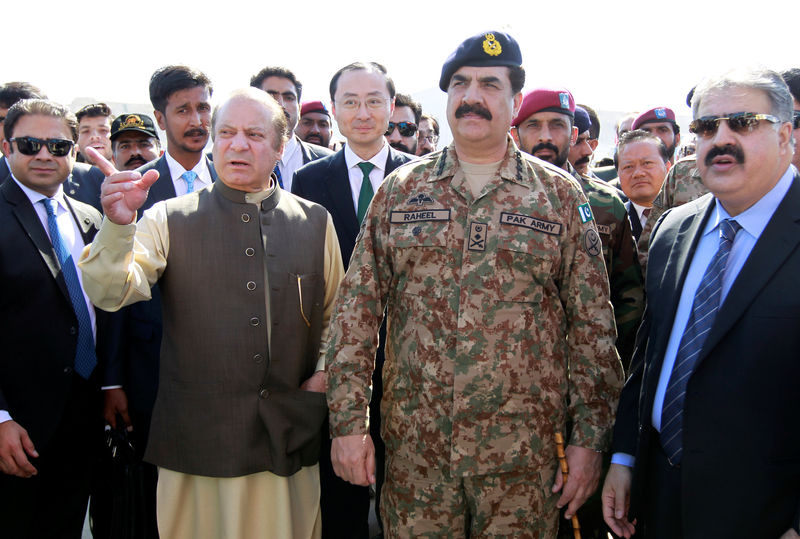By Asad Hashim
ISLAMABAD (Reuters) - Pakistan's powerful army chief Raheel Sharif began a round of farewell visits on Monday, his spokesman said, damping speculation he might receive an extension when his three-year term ends this month.
The general has been immensely popular among ordinary Pakistanis, who see him as having effectively tackled crime and corruption, besides carrying the fight against Islamist terrorism to unstable tribal areas.
Sharif, who is due to retire on Nov. 29, had never said he would seek an extension, but speculation of such a move has recently been rife in the media and among politicians.
"Army chief kicks off his farewell visits beginning from Lahore today," military spokesman Lieutenant-General Asim Bajwa said on social network Twitter, adding that Sharif would meet soldiers on the visits.
"Accomplishment of peace and stability no ordinary task," he added. "Our sacrifices and joint national resolve helped us in offsetting all odds."
The army has ruled Pakistan for roughly half its 69-year history, and tension with civilian governments - including that of current Prime Minister Nawaz Sharif - often runs high.
Sharif himself was ousted from power in 1999 by a military coup. Pakistan's last two army chiefs, including Pervez Musharraf, who led the coup against Sharif, were both given extensions.
Prime Minister Sharif has until Nov. 28 to name his choice of a replacement for the retiring army chief. Typically, the military provides the prime minister the dossiers of three or four contenders from which to choose.
Contenders this year include Lieutenant General Javed Iqbal Ramday, Lieutenant General Zubair Hayat, Lieutenant General Ishfaq Nadeem Ahmad and Lieutenant General Qamar Javed Bajwa, three of the prime minister's aides told Reuters in September.
The succession will also be closely watched overseas.
With nearly 10,000 U.S. troops in Afghanistan fighting the Afghan Taliban and other militant groups, Washington is losing patience with what it calls Pakistan's failure to hunt down insurgents who launch attacks on Afghanistan from Pakistani territory. Pakistan denies this.
India has also ratcheted up rhetoric against Pakistan, alarmed at an escalation of violence in the disputed region of Kashmir, where an attack on an army base killed 18 soldiers. Islamabad denies accusations it was behind the raid.
At home, military operations under Sharif have targeted Islamist militants, including the Tehreek-e-Taliban Pakistan, in 2014, besides a crackdown on crime in the southern port city of Karachi, Pakistan's largest.

Overall violence has fallen since, but large-scale attacks have surged recently, with at least 185 people killed in three major attacks since August.